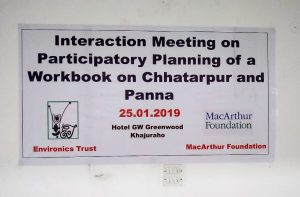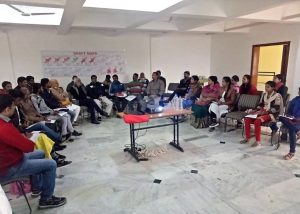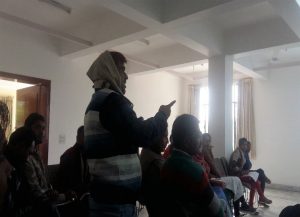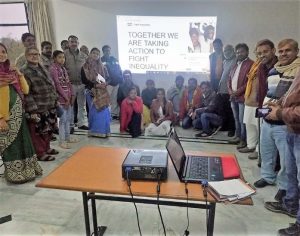 Environics Trust is aiming to develop a workbook on Panna and Chhatarpur districts for further informative planning and execution of governmental and non-governmental schemes and practises. The meeting started with the purpose and meaning of workbook. Workbook is a collection of data presented with various mediums (charts, maps, tables) for a better understanding of the prevailing problems and the suggestive solutions. Thus it is also a tool to study spatial data (read ground information), especially when enough data is not available, we can study and observe correlative data. This would be a contributed effort of various users and concerned organisations. Taking an example of BPL data, with educational institutions, health facilities and livelihood, govt. and non-govt. organisations nearby, ease of access (transport) and natural and man-made resources would give us a clearer view to the problems. The solutions for the native communities and presenting these issues with spatial reference would make this workbook a better alternative to extract, represent, execute and apply solutions. We need to identify pockets of areas with similar problems and need to see these areas with various themes to get a clearer picture. The administrative structure is proving ineffective to deal with the on-going issues in these pockets, one such example being MNREGA, an employment generating scheme focusing on poorer classes is proving ineffective, a local added.
Environics Trust is aiming to develop a workbook on Panna and Chhatarpur districts for further informative planning and execution of governmental and non-governmental schemes and practises. The meeting started with the purpose and meaning of workbook. Workbook is a collection of data presented with various mediums (charts, maps, tables) for a better understanding of the prevailing problems and the suggestive solutions. Thus it is also a tool to study spatial data (read ground information), especially when enough data is not available, we can study and observe correlative data. This would be a contributed effort of various users and concerned organisations. Taking an example of BPL data, with educational institutions, health facilities and livelihood, govt. and non-govt. organisations nearby, ease of access (transport) and natural and man-made resources would give us a clearer view to the problems. The solutions for the native communities and presenting these issues with spatial reference would make this workbook a better alternative to extract, represent, execute and apply solutions. We need to identify pockets of areas with similar problems and need to see these areas with various themes to get a clearer picture. The administrative structure is proving ineffective to deal with the on-going issues in these pockets, one such example being MNREGA, an employment generating scheme focusing on poorer classes is proving ineffective, a local added.
The problems can come up at various levels and identifying these problems and their solutions are needed to focus on. How would you (the end user) describe the problems in your area to give a better picture to higher ups to tackle these problems? Therefore, collaborative efforts and the on-going information flow would make the workbook an effective and time-saving tool to solve issues on various scales.
Panna and Chhatarpur both have the major proportion of rural people where the geographical and physiographical settings also pose a challenge. Some of the common problems seen in these two districts are unemployment, lack of education, lack of information on schemes and rights, food security, migration, land disparity, malnutrition, amenia, improper health facilities, and silicosis. Various NGOs and governmental officials from health and labour department participated and surveys conducted in these areas formed a basis of the discussion – how we should proceed with the workbook.
 During the open session, social security and protection (especially for old, handicaps and widows) were considered to include in the workbook, most of these are far-neglected due to official process and time-taking paper work. One instance was put forth by Mukesh Kumar Patil, Superintendent of Viklang Kalyan Samiti, Khajuraho. He said people in rural areas are unaware of what physically handicapped means and the benefits provided by government to them. It was found that affected communities don’t have such information and in most cases middle-men takes away the benefits. Further, widows not having death certificates/cards of their husbands, cannot avail the pensions benefits provided to them by government as they lack the information and resources. Therefore, it is invalid to blame the government directly, as technically Gram Sabha should take care of such cases, which is not taking its responsibility. Zero Balance account, which was popular at one point in these regions, is now at bay, as most of the inheritors have faced fraud-like situations. where they are not getting any benefits directly and because of which their accounts hardly have any cash. Therefore, spread of timely and qualitative information should be the focus so that true beneficiaries can take the optimum benefit of these schemes.
During the open session, social security and protection (especially for old, handicaps and widows) were considered to include in the workbook, most of these are far-neglected due to official process and time-taking paper work. One instance was put forth by Mukesh Kumar Patil, Superintendent of Viklang Kalyan Samiti, Khajuraho. He said people in rural areas are unaware of what physically handicapped means and the benefits provided by government to them. It was found that affected communities don’t have such information and in most cases middle-men takes away the benefits. Further, widows not having death certificates/cards of their husbands, cannot avail the pensions benefits provided to them by government as they lack the information and resources. Therefore, it is invalid to blame the government directly, as technically Gram Sabha should take care of such cases, which is not taking its responsibility. Zero Balance account, which was popular at one point in these regions, is now at bay, as most of the inheritors have faced fraud-like situations. where they are not getting any benefits directly and because of which their accounts hardly have any cash. Therefore, spread of timely and qualitative information should be the focus so that true beneficiaries can take the optimum benefit of these schemes.
 Inclusion of crime and police in order to assess the potential lenders, employers and others person’s trustworthiness was discussed. Also, it will make more sense if farmers’ suicides too are included in the workbook. Reasons and rates of such instances spatially located, would decipher the trends of major problems, pin-pointing the area.
Inclusion of crime and police in order to assess the potential lenders, employers and others person’s trustworthiness was discussed. Also, it will make more sense if farmers’ suicides too are included in the workbook. Reasons and rates of such instances spatially located, would decipher the trends of major problems, pin-pointing the area.
Prithvi Trust workers, a local NGO pointed that scholarship amount of Rs 600 for 10 months is being given to school going girl child under Samagra Shiksha. Including this theme in the workbook would point out towards the efficacy of scheme as well as proportion of the beneficiaries.
Members from Madhu Human Skill and Development Organization, another local NGO, discussed how pregnant women particularly avoid taking iron and anti-biotic medicines during pregnancy as they are unaware of its ill-causes or because of social stigma. Also the workshops by ASHA workers seldom see any younger crowd as they feel there is no need to participate. Thus, it is important to work upon such issue referring it spatially.
Tourism, which is one of the basic source of income for most of families residing in these districts, has dropped more than 32% in the last 4 years (Annual Report of Tourism of Madhya Pradesh 2011-2012) due to poor connectivity issues, losing both domestic and international tourists. Therefore, inclusion of this theme is equally pivotal in order to sustain this industry which accounts to 10 percent of India’s GDP and 10 percent of total employed domestically.
 Aditya Valmiki, President of Safai Karmi Trade Union, Chhatarpur, said how government’s schemes and their benefits almost never reach them. The terrible conditions they face by cleaning the sewage sites and dump areas manually, the hazardous environment in which they do all the cleaning, should be done by municipal bodies. Also, the inclusion of this theme in the workbook can site the proportion of people working and the number of diseases caused due to living in these conditions. The data and study of such theme would benefit the lives of such scavengers.
Aditya Valmiki, President of Safai Karmi Trade Union, Chhatarpur, said how government’s schemes and their benefits almost never reach them. The terrible conditions they face by cleaning the sewage sites and dump areas manually, the hazardous environment in which they do all the cleaning, should be done by municipal bodies. Also, the inclusion of this theme in the workbook can site the proportion of people working and the number of diseases caused due to living in these conditions. The data and study of such theme would benefit the lives of such scavengers.
The discrimination and disparity among individuals of various classes and disabilities due to lack of information and orthodox thinking is very common and often people end up suffering in the end. Therefore, this workbook will be a tool to highlight deficiencies and effective measures to deal with these problems.
Author – Alisha Khan

Recent Comments